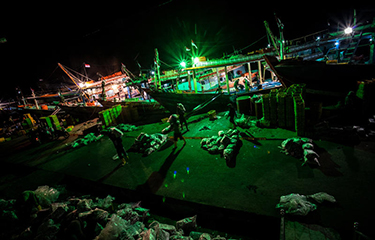Greenpeace report says forced labor persists in Southeast Asia fishing sector

Slavery continues to plague the fishing sector in Southeast Asia, according to a new report from Greenpeace Southeast Asia.
Relying on interviews, documents, and other information, the report painted a picture of Indonesian, Filipino, and other Southeast Asian migrant fishermen working aboard distant-water vessels owned by foreign countries and suffering from mistreatment, human rights abuses, and forced labor.
The report, titled “Seabound: The Journey to Modern Slavery on the High Seas,” accused 13 foreign distant-water vessels registered in China, Taiwan, Vanuatu, and Fjij of labor abuses such as deception, wage withholding, excessive overtime, and physical or sexual abuse.
A 24-year-old former crew member that the report identified as Mr. Z told Greenpeace about his experience in May of 2018.
"I was forced to work without enough rest and food. I was exhausted and could not continue my duty," Mr. Z said. "I saw that others went for a rest. I stopped and went to the galley but food was not served anymore. My boss came to me and asked, ‘What’s your problem?’ I asked back, ‘Don’t you know the rules, also I need to rest and eat food, what’s my fault?’”
Mr. Z worked for the Zhong Da 2, a Taiwanese-owned longliner. Greenpeace said that representatives of the Zhong Da 2, like other vessels mentioned in the report, did not provide comments responding to the report's allegations.
Greenpeace also partnered with the Indonesian migrant workers union Serikat Buruh Migran Indonesia to analyze contracts, letters of guarantee, and other documents – illuminating a recruitment system that entraps many migrant Indonesian fishermen.
One migrant Indonesian worker told Greenpeace that he did not receive any salary during his first six months working for the Taiwan-owned Chin Chun 12. Greenpeace said vessel representatives did not respond to the accusations. Another worker aboard the Taiwanese vessel Lien Yi Hsing said he only received USD 50 (EUR 44) in his first four months; representatives of the vessel told Greenpeace that they denied the accusations.
Greenpeace called for the enforcement of national laws protecting migrant fishermen rights – and for the creation of new laws where none currently exist.
“Despite national policies to protect migrant workers and international treaties on fisheries management, it is unthinkable that modern slavery continues to thrive within the fishing industry,” Greenpeace Southeast Asia Oceans Campaigner Arifsyah Nasution said in a statement. “This business-as-usual can no longer continue, and the never-ending complaints of injustice and abuse must be addressed immediately by all stakeholders."
Greenpeace blamed governments, corporations, and consumers for the persistence of seafood slavery, saying that all of them have failed to do enough to protect the rights of migrant fishermen in seafood supply chains.
Photo courtesy of Jurnasyanto Sukarno/Greenpeace






Share